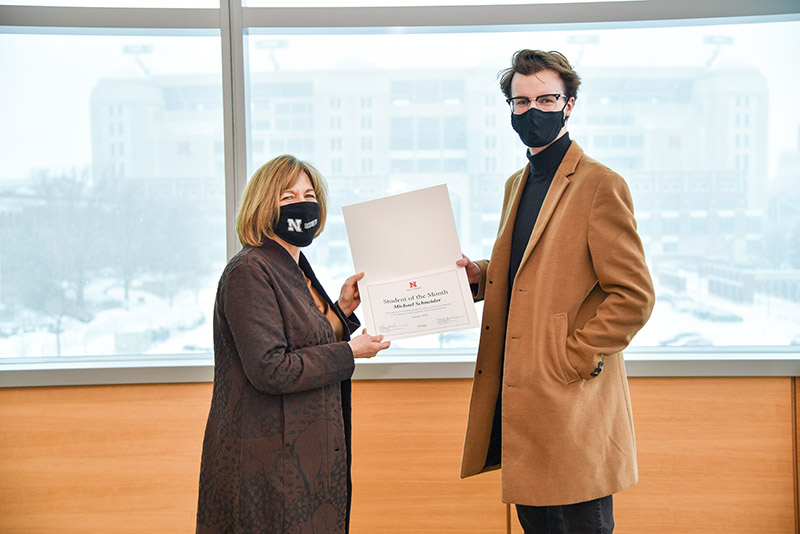For more than 100 years, business leaders, policymakers and communities made better decisions based on economic research and reports produced by the Bureau of Business Research (BBR) at the University of Nebraska–Lincoln. An applied economic and business research entity, the bureau provides relevant information and insightful data on economic conditions in Nebraska, the Great Plains and the nation, as a service to individuals and businesses in the state.
“We publish reports summarizing BBR-sponsored research studies, outlooks and analyses, including the monthly Nebraska Leading Economic Indicator to measure and project the Nebraska economy,” said Dr. Eric Thompson, director of the bureau and K.H. Nelson Professor of Economics. "The Nebraska Leading Economic Indicator helps people better understand the factors that play a role in the growth and decline of economic conditions in our communities."
In addition to their bureau-sponsored research, Thompson and a team of three faculty and staff tackle grant-funded projects to turn data into valuable economic insight for chambers of commerce, government entities including the U.S. Department of Commerce, and companies. Research studies span topics like economic competitiveness, economic modeling and forecasting, labor market analysis, fiscal analysis, policy analysis and tourism impact.
“Nebraska business professionals and owners benefit from the work we do," Thompson said. "For example, the Nebraska Thriving Index is the first economic and quality of life benchmarking tool for rural Nebraska. This index identifies strengths and shortcomings in worker skills, infrastructure and other economic resources that can guide policy decisions and help track economic progress.”
Additionally, the bureau worked with the Omaha Chamber of Commerce to produce its 2020 Barometer, an economic scorecard for the Greater Omaha region covering economic and performance-related categories to evaluate the city's competitiveness against nine other high-performing metros. For Tim Stuart, J.D., legislative counsel for the chamber, grant-funded studies like this and other resources provided by the bureau fuel their ability to achieve greater impact.
"Data like what's examined in the Barometer offers a broader picture of strengths and needs as we look to future development in the region. The BBR provides valuable data and analysis on the economy and economic development - issues central to the Greater Omaha Chamber’s mission. Its reports and research on issues such as workforce needs and trends deliver information that businesses need as they plan for growth and the chamber needs to assist in realizing that growth," Stuart said. "I also frequently attend their webinars as they touch on a number of areas that go directly to the Chamber’s economic development efforts, covering sectors such as manufacturing, agricultural production and processing, and military installations."
These free webinars are part of numerous outreach efforts to get information to people who can put it to use and positively impact the state and region. More than 1,000 people from 16 states and 70 towns across Nebraska attended these webinars offered on various topics. In May 2020, Thompson presented a webinar, Resilience and Recovery: The Economy Responds to the COVID-19 Pandemic, attended by small business owners, Fortune 500 company management, state legislators, economic development officers and university alumni.
 Dean Kathy Farrell recently presented the honor of Nebraska Business Student of the Month honor to Michael Schneider, a senior economics and mathematics major. He was nominated in part for his work and success as a BBR Scholar.
Dean Kathy Farrell recently presented the honor of Nebraska Business Student of the Month honor to Michael Schneider, a senior economics and mathematics major. He was nominated in part for his work and success as a BBR Scholar.
Some webinars are co-led by undergraduate student researchers. As part of the College of Business, students also participate in the bureau's research. Called BBR Scholars, the 15 students learn advanced economic research methods and techniques, collaborate in writing research reports and present study findings.
“Our BBR Scholars co-author numerous reports, newsletters and articles, including Business in Nebraska. They also facilitate seminars and training sessions. With their training, BBR Scholars benefit Nebraskans now and will bring value to their future organizations after they graduate,” said Dr. Mitch Herian, BBR project director.
Michael Schneider, a senior economics and mathematics major from Sioux Falls, South Dakota, works closely with Herian as a BBR Scholar. Schneider's transformational BBR experience led him to pursue graduate study to further prepare him for a career using his research skills.
"I've gotten research experience, training in technical skills like using the R programming language and made connections with professors. Working with Dr. Herian, he played a significant role in shaping my career interests," he said. "Sometimes I ask him task-specific questions, sure, but the most valuable aspect of this type of mentorship is getting a perspective on how he approaches problems, what sort of questions he asks, what sort of solutions he draws up. How do you learn to think like a researcher? By working closely with researchers."
Growing the BBR Scholars program to mentor more students serves as one goal for Thompson. He also looks to expand the bureau's impact by doing more research for the commercial real estate industry and securing federal grants to produce research and reports on national economic conditions.
To explore the numerous reports and view past webinars hosted by the Bureau of Business Research, visit: https://bbr.unl.edu. To support the bureau's work producing economic reports, donate to the Bureau of Business Research Development Fund.
Published: February 18, 2021